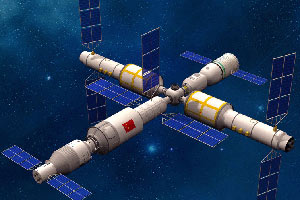China plans to launch its Tiangong-2 space laboratory in 2016 and, after the launch of the lab, the Shenzhou-11 spacecraft and Tianzhou-1 cargo spacecraft will be launched to dock with it.
The announcement was made by Yang Liwei, dputy chief of?China's Manned Space Agency, at a press conference of the annual meeting of the Association of Space Explorers, which opened in Beijing on Wednesday.
Around 2018, a core experimental space module will be launched ahead of the space station being completed in around eight years' time, according to Yang, who became China's first astronaut in the Shenzhou-5 manned space mission in 2003.
A new launch center in the southernmost province of Hainan is almost completed and can already launch space vehicles, he added.
China launched its first space lab, Tiangong-1 in September 2011, and in June 2012, it docked with the manned Shenzhou-9 with three astronauts onboard. In June 2013, Shenzhou-10 docked with the lab and the three astronauts delivered a physics lesson onboard Tiangong-1.
Since the government approved a manned station program in 2010, the program has been progressing steadily, as various modules, space vehicles and ground facilities are under development.
The development of Tiangong-2, Tianzhou, Shenzhou-11, and the Long March 2F carrier rocker is at the key stage, while astronauts and ground facilities will soon start preparing for their missions, Yang said. The core experimental module and the two space labs will also begin to be tested soon.
The first group of Chinese astronauts will retire in the near future and the country will select new astronauts, including females, the report said.
 |
 |
